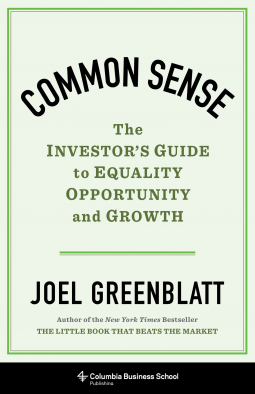
Common Sense
The Investor's Guide to Equality, Opportunity, and Growth
by Joel Greenblatt
This title was previously available on NetGalley and is now archived.
Send NetGalley books directly to your Kindle or Kindle app
1
To read on a Kindle or Kindle app, please add kindle@netgalley.com as an approved email address to receive files in your Amazon account. Click here for step-by-step instructions.
2
Also find your Kindle email address within your Amazon account, and enter it here.
Pub Date Sep 08 2020 | Archive Date Dec 16 2020
Talking about this book? Use #CommonSense #NetGalley. More hashtag tips!
Description
In Common Sense, the New York Times best-selling author Joel Greenblatt offers an investor’s perspective on building an economy that truly works for everyone. With dry wit and engaging storytelling, he makes a lively and provocative case for disruptive new approaches—some drawn from personal experience, some from the outside looking in. How can leading corporations immediately disrupt our education establishment while creating high-paying job opportunities for those currently left behind? If we want a living wage for everyone, how can we afford it while using an existing program to get it done now? If we subsidize banks, what simple changes can we make to the way we capitalize and regulate them to help grow the economy, increase access, and create more jobs (while keeping the risks and benefits where they belong)? Greenblatt also explains how dramatically increasing immigration would be like giving every American a giant bonus and the reason Australia might be the best place to learn about saving for retirement.
Not everyone will agree with what Greenblatt has to say—but all of us can benefit from the conversations he aims to start.
Available Editions
| EDITION | Other Format |
| ISBN | 9780231198905 |
| PRICE | $19.95 (USD) |
Average rating from 4 members
Featured Reviews
 Joseph G, Reviewer
Joseph G, Reviewer
I received a review copy of “Common Sense” in exchange for a fair review. Joel Greenblatt is an engaging writer. I enjoyed his “The Little Book That Beats The Market.” He explains financial concepts in an engaging way that doesn’t require knowledge of sophisticated math concepts and so I was intrigued about the title and thought that he would be discussing a more socially responsible way to invest. However, this book is only very, very peripherally related to investing. It is more a policy-oriented book about education, immigration and banking regulation.
I am not of the opinion that an expert in one area of knowledge can’t make a cogent and authoritative argument in other areas, so I was amenable to hearing his views. On education, he convincingly argues that public education is just as much about politics ( if not more) than being held accountable for overall excellence. He is a believer in public charter schools so that children who live in zip codes with high levels of poverty and a lower income tax base can achieve academic success.
He also argues for “alternative certification,” for students who don’t pursue the college route. He believes businesses could hire workers who have the necessary skills to be hired without a college degree by designing educational offerings that would demonstrate knowledge and understanding, This would be a good idea provided children are not “funneled” in this direction because of poor schools. Fix the root problem rather than design a work-around.
Greenblatt also champions the benefit of highly-skilled immigration from an economic perspective and courageously outlines the cost:benefit of immigration based on various educational levels. Fortunately, he doesn’t demean the noble history of the US in accepting immigrants who might not have an advanced education. Unfortunately, in the current political environment, I fear that any argument against immigration is one that loses nuance and is used to promote the most restrictive version of immigration possible and heightens an “us versus them” mentality that is not conducive to understanding and tolerance.
I think his perspectives on banking ( too lenient in my opinion) and allowing individual investments in Social Security (he cites Australia as a model) as part of a more robust retirement income replacement policy is fraught with too many unknowns and therefore risky, but he puts forth a sensible argument.
In conclusion, this book, based on the writer’s background, is misclassified as an “investing” book under the traditional definition of investing and investment, but it’s still a well-written book that looks to improve our current socioeconomic condition and can generate some civil discussion., which is no small thing.
 Reviewer 262225
Reviewer 262225
The author, Joel Greenblatt, in this book talks about a few major things that have hurt the common person , small businesses and elders in the US and these are - Education, Banks, emigration and social security.
The author laments that the US education system systematically sends the poor and minority children to the worst school and the available remedies are not helping to improve it. Areas with high income groups get good schools and areas which have minorities and people with low income get poor schools.
Similarly the author says that the banking system is subsidized and the govt should get over it. Even if they are subsidized their lending rates should be attractive for small industries and individuals. And, I think that makes sense because it’s tax payers money that is being used to subsidize the big banks. About social security the author says that the voluntary social security programs are not helping the bottom half of the population because they generally do not start early to make it work in the long run and their incomes are also not stable.
The author exhorts the people to share ideas and have more discussions around these issues so that the economy can improve and that will help everyone.
I think that this is a good book and people should read and be vocal about the issues that it talks about. Maybe some policy makers would listen to that.



